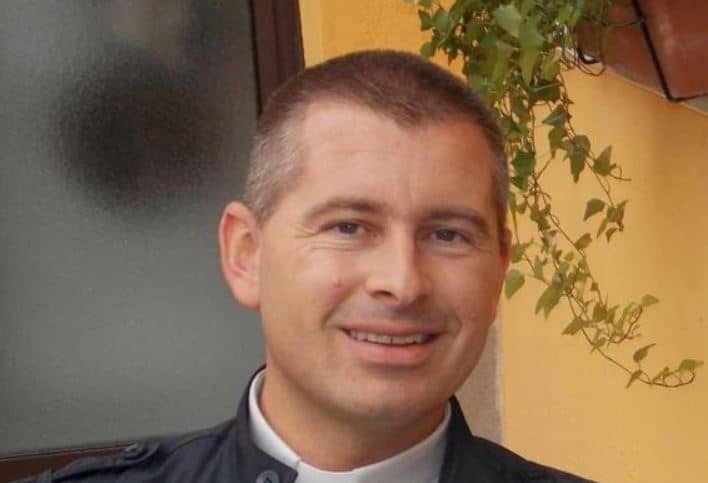MYTILENE, Greece — The Vatican and the Greek government agree on what should happen to the asylum-seekers in Greek camps: They should be welcomed by European communities and helped to build a new life on the continent.
Exactly how that should happen seems unclear, though.
Cardinal Konrad Krajewski, the papal almoner, went to the Greek island of Lesbos May 8-9 to assure both refugees and residents that Pope Francis remembers them, to deliver financial donations to projects helping the refugees and to try to get something moving to help those currently in camps “live again, work and raise their families.”
He met with the government official in charge of all the camps in Greece, the director of the Moria and Kara Tepe camps on Lesbos, the mayor of Lesbos and the commander of the Greek police for the North Aegean region, which includes Lesbos.
They all agree members of the European Union should be doing more to ease the burden on Greece and to alleviate the suffering of the 70,000 migrants and asylum-seekers still living in Greek camps. But, apparently, not much will happen before the European Parliament elections in late May.
The Greek government talks about “relocation schemes,” which would transfer migrants and asylum-seekers to camps in other countries, but that would require EU negotiations and agreements that do not seem to be in the works.
Krajewski, supported by the Migrants and Refugee Section of the Dicastery for Promoting Integral Human Development and aided by the Community of Sant’Egidio, wants to see an immediate expansion of the “humanitarian corridors” project.
Sant’Egidio, a Catholic lay community in Rome, and the Italian federation of Protestant churches, launched the project in February 2016 after securing from the Italian government guarantees for the issuing of humanitarian visas. The migrants and refugees taken into Italy — and now France, Belgium and Luxembourg — are fully supported by the church communities.
Ioannis Balpakakis, director of the “hotspot” or official migrant and refugee camp at Moria on Lesbos, said the camp and the informal tent settlement next to it were hosting 4,752 people on the day the cardinal visited. Eighty-two percent of the total were people from Afghanistan, 3.5 percent were from Congo and 2.5 percent were from Syria.
The whiteboard in his office showed no new arrivals that day or the day before. So far in 2019, there had been 2,783 arrivals. Twenty people had been deported, 48 recognized refugees were resettled by the International Organization for Migration and 2,975 had transferred to the Greek mainland.
Mario Kaleas, director of the Greek government’s asylum service, which determines which of the new arrivals will be allowed to stay and which will be deported, met Krajewski in the camp and told him that none of the migrants and refugees planned on Lesbos or even Greece being their final destination.
“They crossed the sea with big dreams, mostly to reach Germany” where they hear there are jobs, Kaleas said. But EU regulations require them to stay in the first EU country then enter — Greece, in this case.
Sixty percent of those applying for asylum receive it after their initial application, he said. Those who are denied can appeal, but most of them must stay in a camp while they wait, which means some people are there for much more than the average nine months.
Andreas Gougoulis, the Greek government’s secretary-general for migrant reception, told the cardinal, “As long as Europe is closed, our only choice is to expand the camps.” Greece is hosting 70,000 asylum-seekers, and more continue to arrive.
Krajewski kept telling every government official he met that the Catholic Church is willing to help. With a big grin, he even went so far as to tell the director of the Kara Tepe hospitality center, “We’ll take them all.”
The center is home to 1,300 people, mostly large families or families with a child who has special needs.
The cardinal told Spiros Galinos, mayor of Lesbos: “As the Catholic Church, we are ready to welcome these people. Someone just must open the gates.”
When the crisis began in 2015 — and brought 1.2 million people to Lesbos in less than a year — “no one was ready,” the mayor said. “No one had any idea what was about to happen. Lesbos paid tribute to Europe by standing up and bearing the whole weight of the crisis alone.”
At that point, he said, the extreme political right party, with its xenophobia and anti-immigrant positions, had no influence at all “or at least their words were seeds that fell on barren ground. But now they are finding fertile ground.”
Europe must help, he said. “Think of a weightlifter; he can lift only a certain amount over his head. You can’t just keep adding weights.”
Krajewski told the mayor he prayed the people of Lesbos would “continue to live according to the Gospel, because Jesus would have done the same thing the people of Lesbos did” when thousands of exhausted refugees began arriving by boat.
“We must share the burden,” the mayor said. “If we do that, it will not be a burden too heavy for anyone.”

















